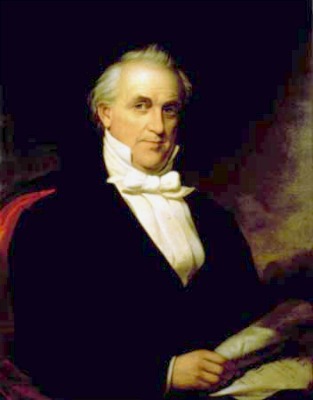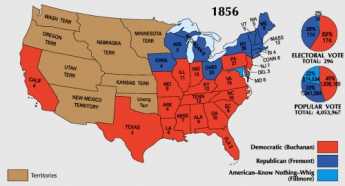Related Topics
Philadelphia Politics
Originally, politics had to do with the Proprietors, then the immigrants, then the King of England, then the establishment of the nation. Philadelphia first perfected the big-city political machine, which centers on bulk payments from utilities to the boss politician rather than small graft payments to individual office holders. More efficient that way.
Central Pennsylvania
"Alabama in-between," snickered James Carville, "Philadelphia, Pittsburgh, and Alabama in-between."
James Buchanan: The President from Lancaster

|
| President James Buchanan |
Digby Baltzell (writing in Puritan Boston and Quaker Philadelphia) uses the reputation of President James Buchanan among historians as an example of how poorly Quaker Pennsylvania compares with Puritan Massachusetts, which had four Presidents, all of the men of great stature, while Pennsylvania only had poor Buchanan. To a loyal Pennsylvanian, that's irritating talk, and to it must be added, the only national monument to Buchanan had to be paid for by his own niece, Harriet Lane; construction of even that dinky statue was held up nearly a century by his detractors. It sits in Meridian Hill Park in Washington DC, right next door to where I lived for two years while working at the National Institutes of Health. It seems a little like a personal insult to my little children who played there, that some group or other of historians talk unpleasantly about Pennsylvania's only President.
Buchanan started political life as an elected Federalist, so he seems unlikely to have been secretly sympathetic with secession. A quick look at the map of electoral voting in 1856 shows it was a three-way election, with the peculiarity of the anti-immigration (Know-Nothing) party removing the western part of the country from contention. Essentially, the election was evenly divided between the abolitionist Republicans in the North and the slave states of the South. Swing Pennsylvania and New Jersey toward one side or the other, and you win the election. Buchanan's attraction as Pennsylvania's favorite son won him the Democrat nomination, and hence the election. It's pretty clear that Buchanan politically did owe the South, big-time.

|
| Meridian Hill Park in Washington DC |
That doesn't necessarily make him pro-slavery, but it surely means the South thought he was their best choice. The reasons behind that trace back to his activities on behalf of annexing Cuba while he was Minister to Great Britain. Cuba was bankrupt and having revolutions, and Spain itself wasn't much more effective. These arguments were persuasive to Republicans forty years later when Teddy Roosevelt led the charge and McKinley provided the dubious pretext of the explosion of the battleship Maine. Underneath these jingoist pretexts, the real disputes about Cuba were the Manifest Destiny argument (The United States ought to absorb the whole Caribbean region), and the likelihood that Cuba would be a slave state. The United States House of Representatives had become hopelessly abolitionist as a result of European immigration, so the main hope of the South to stave off abolition of slavery rested with increasing its strength in the U. S. Senate. So the North was favorable to annexing Cuba for Manifest Destiny reasons, while the South was also in favor because of the Senate issue. Buchanan as a politician probably didn't have much trouble seeing himself as a hero by promoting the annexation of Cuba, by force if necessary. The South meanwhile made a decision to seek Senate votes in Kansas and Missouri, since to do so fitted in with another strategy of using their Congressional influence to weaken the military strength of the United States, since that would, of course, be used against them if it came down to a war of secession. It also made a Cuban conquest somewhat more dubious, but in politics, you always have to make choices.
Although it is not much mentioned by historians, that hidden second strategy did, in fact, work out for them. When poor Buchanan got elected and struggled to maintain peace, he found he lacked the military strength to make threatening noises, and indeed General Winfield Scott had to warn him against transferring troops to defend the installations at Fort Sumpter and other Southern locations. This weakening of Union strength is also a largely unmentioned factor in the miserable early performance of the Union armies, early in the Civil War.

|
| Electoral Vote 1856 |
Both the Abolitionists in the North and the Pro-slavery conspirators in the South presented a vexing pattern of intransigence to the beleaguered Democratic President; after all, they were still American citizens and voters. Although Lincoln in 1860 was not nearly so mindless as many of the other Abolitionist leaders, he was running for President with a clearly anti-slavery program. John Brown was starting insurrections. Whether the Southern hot-heads would blink at the last moment was not clear, but while the pressure on them was that time was running out for their cause, a President mostly elected with their votes still posed an issue that had to restrain them. Time seemed to be on the abolitionist side; no one ever suggests that we would still have slavery in 2011 if there had been no Civil War. If everyone had known we would have 600,000 deaths in that war, the alternative of playing for time would not have seemed so timid.
History is written by the victor, as they say. And then there is the Henry Ford theory of history. Some parts of it, at least, are bunk.
Originally published: Sunday, February 27, 2011; most-recently modified: Wednesday, May 22, 2019